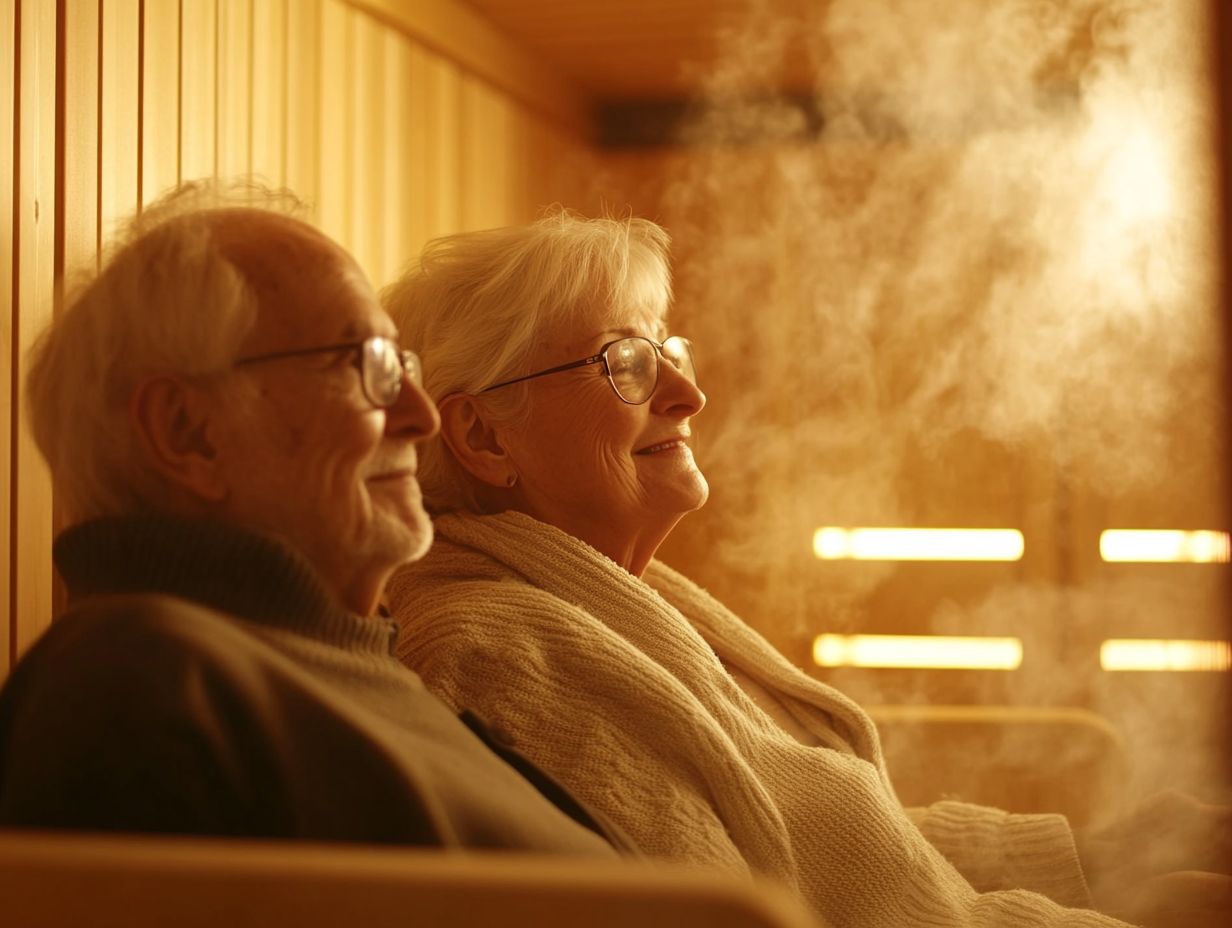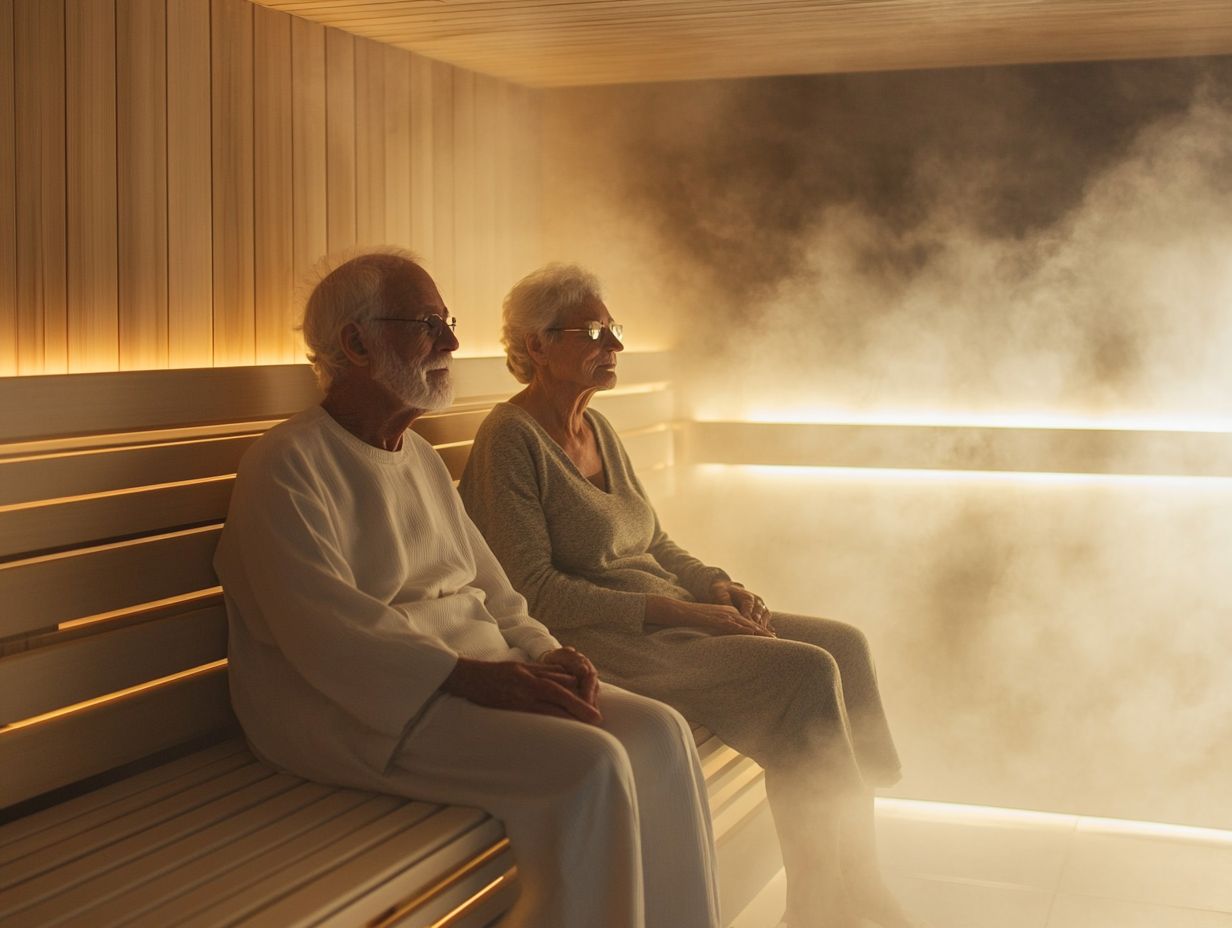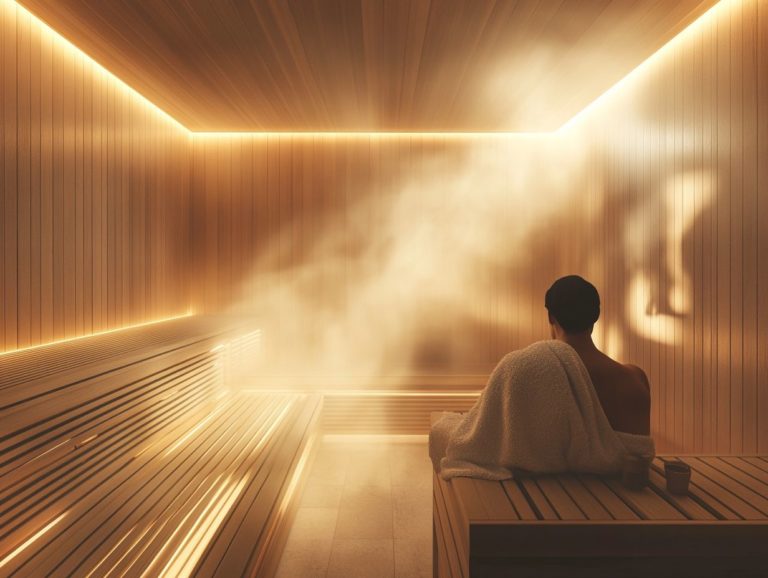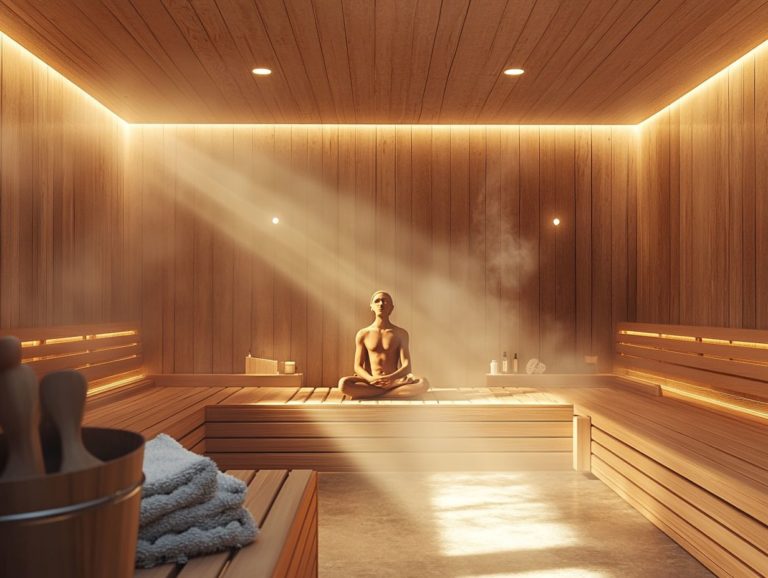5 Benefits of Sauna Therapy for Senior Health
As individuals age, the significance of maintaining health and well-being cannot be overstated. Sauna therapy has become a remarkable ally for seniors, providing a multitude of benefits, from helping reduce chronic pain and inflammation to enhancing cardiovascular health.
You ll discover five key advantages of sauna therapy, understand how it works, and receive essential tips for safe use, especially tailored for seniors. Whether you re an experienced sauna enthusiast or simply exploring its potential, there s valuable insight here for everyone.
Contents
- Key Takeaways:
- 1. Relieves Chronic Pain and Inflammation
- 2. Improves Cardiovascular Health
- 3. Boosts Immune System
- 4. Promotes Relaxation and Better Sleep
- 5. Can Help with Skin Conditions
- What Is Sauna Therapy and How Does It Work?
- Can Sauna Therapy Benefit Other Age Groups as Well?
- Frequently Asked Questions
- What are the benefits of sauna therapy for senior health?
- How often should seniors use a sauna for optimal health benefits?
- Is sauna therapy safe for all seniors?
- Can sauna therapy improve skin health for seniors?
- Are there any potential risks or side effects of sauna therapy for seniors?
- Can sauna therapy help with respiratory issues for seniors?
- Conclusion
Key Takeaways:

- Sauna therapy can help reduce chronic pain and inflammation, making it a beneficial treatment option for seniors dealing with arthritis and other age-related conditions.
- Regular use of saunas can improve cardiovascular health in seniors by increasing blood flow, lowering blood pressure, and enhancing overall heart function.
- By stimulating the production of white blood cells, sauna therapy can boost the immune system and help seniors stay healthy, fighting off infections and illnesses.
1. Relieves Chronic Pain and Inflammation
Sauna therapy is known for its impressive ability to help reduce chronic pain and inflammation. This makes it a favored option for those dealing with conditions like arthritis and fibromyalgia. The heat generated during sauna sessions raises your body temperature, easing muscle tension and fostering relaxation, creating a comprehensive approach to pain management.
The elevated temperature also improves blood circulation, allowing more oxygen and nutrients to reach damaged tissues. This improved blood flow can significantly reduce swelling and speed up recovery, particularly for individuals facing chronic conditions, including those suffering from COPD and asthma.
Many studies show that using a sauna regularly can lower pain levels and boost mobility for arthritis patients. Testimonials from individuals with fibromyalgia emphasize its effectiveness, with many sharing experiences of reduced pain and improved mood after consistent sauna sessions.
Together, these insights highlight the potential of sauna therapy as a valuable complement in managing chronic pain.
2. Improves Cardiovascular Health
Regular sauna sessions have been scientifically linked to enhanced cardiovascular health, with research highlighting their positive effects on heart function and blood circulation. This makes sauna bathing an essential practice for anyone looking to protect their heart health.
Engaging in sauna therapy promotes relaxation and plays a vital role in lowering blood pressure, making it an appealing choice for those seeking to improve their overall heart function. A 2020 research review illuminated the many physiological benefits associated with frequent sauna use, revealing significant enhancements in how well blood vessels work and the health benefits of steam saunas.
Individuals who indulge in regular sauna sessions often experience improved arterial elasticity and reduced stiffness, both of which foster better blood flow. Additionally, 5 ways saunas aid in mental wellness highlight the benefits of incorporating sauna bathing into a wellness routine, empowering you to take proactive steps toward protecting your heart health.
Looking for relief from chronic pain? Sauna therapy could be your answer! Consider trying it out or consulting a health professional for personalized advice.
3. Boosts Immune System
Utilizing sauna therapy can significantly enhance your immune system, promoting detoxification and reducing inflammation. Both are essential for maintaining respiratory health and addressing conditions like COPD and asthma. Regular sauna use frequency plays a critical role in reaping these benefits.
This practice involves exposing your body to elevated temperatures, which triggers a series of body responses that boost the production of white blood cells and antibodies key players in your defense against infections. Research indicates that regular heat exposure helps dilate blood vessels, improving circulation and delivering more oxygen to your tissues, potentially benefiting those with chronic respiratory issues, including individuals facing hypertension.
Sauna use stimulates the release of heat shock proteins, which are proteins that help your cells recover from stress. This exemplifies the multifaceted advantages of heat therapy for overall well-being.
4. Promotes Relaxation and Better Sleep

Sauna bathing offers more than just a therapeutic escape; it cultivates a deep relaxation response that can significantly enhance your sleep quality. Sauna therapy is a fantastic way to relieve stress and anxiety, especially for seniors concerned about conditions such as Alzheimer s disease.
As the gentle warmth envelops your body, it encourages muscle relaxation and eases tension. This creates a tranquil atmosphere where your worries can simply fade away.
For many, this relaxation directly translates into deeper, more restorative sleep, leading to notable improvements in mood and overall mental well-being.
It’s crucial to keep in mind the importance of hydration after your sauna session. As your body sweats to cool down, replenishing lost fluids supports your physical health and deepens your sense of relaxation.
This ensures that the benefits of your sauna experience linger well beyond your time in the heat.
5. Can Help with Skin Conditions
Sauna therapy has emerged as a remarkable ally in addressing various skin conditions, including acne and eczema. This practice aids in detoxification and reduces inflammation, ultimately enhancing your skin s health and appearance over time.
An extensive 15-year study illustrates the numerous advantages of regular sauna use. Participants reported noticeable improvements in skin clarity and texture, primarily due to the better blood flow that occurs during these sessions.
As your body sweats in the warmth of the sauna, toxins are expelled, while this increased circulation nourishes your skin, giving it a radiant, youthful glow.
The heat of the sauna opens your pores, allowing for deeper cleansing and helping to alleviate conditions such as acne and eczema. Don’t miss out on this natural solution for your skin issues!
What Is Sauna Therapy and How Does It Work?
Sauna therapy invites you into a world where various sauna types create a controlled, heated environment that elevates your body temperature. This simple act sparks a range of body responses, including relaxation, detoxification, and improved circulation, all of which contribute to its impressive array of health benefits.
Rooted in ancient traditions from regions like Finland and Turkey, sauna therapy has long been celebrated for its remarkable wellness effects. Picture yourself in a traditional Finnish sauna, typically warmed by a wood-burning stove, where dry heat invigorates your body while promoting a serene harmony of mind and spirit.
If you find yourself drawn to infrared saunas, you’ll experience saunas that use light to heat your body directly, offering deep tissue relief and enhanced detoxification without the extreme temperatures. Meanwhile, steam saunas wrap you in soothing moist heat, opening up your airways and relieving tension.
Each sauna type, whether it be wood burning saunas, infrared saunas, or steam saunas, engages different facets of your body s temperature regulation. This leads to a unique relaxation response that nurtures your overall health and wellness.
What Are the Different Types of Saunas?
You ll find a variety of saunas, each offering unique experiences and benefits. From traditional wood-burning saunas to modern infrared saunas and steam saunas, they are all designed to enhance your health and well-being through heat exposure.
Traditional wood-burning saunas heat stones that radiate warmth and create a cozy atmosphere while providing detoxification benefits. Infrared saunas utilize infrared heaters to penetrate deeper into your skin, promoting muscle relaxation and improved circulation. Additionally, saunas help with muscle recovery by enhancing these effects. Steam saunas create a humid environment that can help alleviate respiratory issues and hydrate your skin.
If you re aiming for specific health goals, such as muscle recovery or detoxification, understanding these sauna types helps you make informed choices. This ensures that your selection aligns with your personal preferences and wellness aspirations.
Are There Any Risks or Side Effects of Sauna Therapy for Seniors?

While sauna therapy boasts numerous health benefits, it s crucial to consider the potential risks and side effects, especially as a senior. Pay close attention to your hydration needs and heart-related health to ensure a safe and effective experience.
As you age, your body s ability to regulate temperature and maintain hydration can become less efficient. This elevates the risk of overheating and dehydration during sauna sessions. The heat can also raise your heart rate, which may pose challenges if you have existing heart conditions.
To mitigate these risks, limit your sauna time to 15 to 20 minutes. Make sure you drink plenty of water before, during, and after your sauna experience.
Don t wait to consult with a healthcare provider for personalized advice tailored to your unique health conditions.
How Often Should Seniors Use Sauna Therapy?
Determining the optimal sauna use frequency for seniors is essential to maximize health benefits while minimizing risks. Recommendations typically suggest two to three sessions per week.
This frequency allows individuals to enjoy various advantages of sauna bathing, such as improved circulation, enhanced relaxation, and overall wellness, while providing ample time for recovery. For those interested in social benefits, group sauna sessions can also enhance the experience. It’s vital to consider personal health conditions; factors such as heart-related issues or respiratory problems may require a more cautious approach. Seniors should consult with their healthcare providers to tailor their sauna experiences according to their health status.
Paying attention to hydration and the duration of each session is crucial for ensuring a safe and effective sauna practice, ultimately promoting longevity and vitality.
What Are Some Tips for Seniors Using Saunas?
For seniors embracing sauna therapy, adhering to a few essential tips can enhance the experience while ensuring safety. This involves focusing on hydration and being aware of potential sauna risks.
Proper hydration is key, as dehydration poses a significant concern. Drink water before entering the sauna to prepare your body for the heat. Throughout the session and afterward, maintaining hydration helps replenish lost fluids. Limiting your time in the sauna to about 15-20 minutes can also help prevent overheating, and listening to your body s signals for discomfort is crucial.
Consulting a healthcare provider before starting sauna therapy can offer tailored advice, especially if there are any pre-existing conditions. By integrating these strategies, seniors can enjoy the benefits of adding a sauna to your home while minimizing risks.
Can Sauna Therapy Benefit Other Age Groups as Well?
Sauna therapy offers a wealth of benefits for all age groups. From enhanced relaxation and removing toxins for younger individuals to improved cardiovascular health and chronic pain relief for older adults, the advantages are extensive.
For children, the controlled warmth of a sauna can boost respiratory health and promote better sleep. This makes it an excellent choice for families focused on their children s well-being.
Adults can enjoy the social aspects of sauna use, forging connections while reducing stress and enhancing skin health.
Seniors can find solace in the gentle relief from arthritis symptoms and improved mobility, allowing them to maintain an active lifestyle without strain.
This remarkable versatility illustrates how sauna therapy can be customized to meet the unique needs of each life stage.
Frequently Asked Questions

What are the benefits of sauna therapy for senior health?
- Improved cardiovascular health: Sauna therapy can help seniors enhance their heart health by increasing blood flow and reducing blood pressure.
- Pain relief: The heat from a sauna can alleviate joint and muscle pain common among seniors.
- Removing toxins: Saunas help seniors sweat out impurities, improving overall health and well-being.
- Boosted immune system: Regular sauna use can strengthen the immune system, helping seniors fend off illnesses.
- Stress relief: Sauna therapy promotes relaxation and helps seniors manage stress and anxiety, enhancing mental health.
How often should seniors use a sauna for optimal health benefits?
It is recommended that seniors use a sauna 2-3 times a week for 10-15 minutes each session. Consult a doctor before starting sauna therapy, especially if you have any pre-existing health conditions.
Is sauna therapy safe for all seniors?
Sauna therapy is generally safe for most seniors. However, it’s crucial to consult a doctor before starting, especially for those with certain health conditions like heart disease. Seniors should stay hydrated and take breaks if they feel uncomfortable or lightheaded.
Can sauna therapy improve skin health for seniors?
Yes, sauna therapy can enhance skin health for seniors by increasing blood flow and promoting collagen production, improving skin elasticity and reducing signs of aging.
Are there any potential risks or side effects of sauna therapy for seniors?
While sauna therapy is generally safe, potential risks include dehydration, burns from hot surfaces, and interactions with certain medications. Seniors should consult a doctor before beginning sauna therapy and follow safety precautions while using a sauna.
Can sauna therapy help with respiratory issues for seniors?
Yes, sauna therapy can assist seniors with respiratory issues such as congestion and chronic bronchitis. The heat and steam can open air passages and reduce inflammation. However, it’s important for seniors to consult a doctor before using a sauna for respiratory problems.
Conclusion
Experience the incredible relief sauna therapy provides for seniors! With its multitude of benefits, sauna therapy can be a transformative addition to your health routine. Discover how incorporating sauna therapy into your life can promote well-being today!






